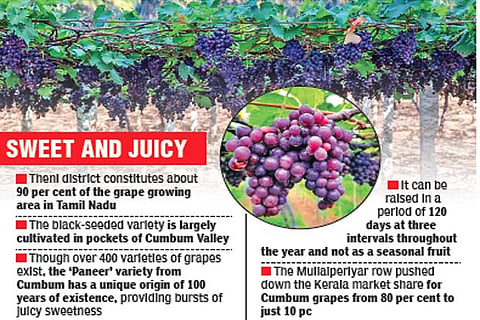

Madurai
Cumbum’s soil is naturally blessed with rich nutrients and conducive for the cultivation of grapes. Cumbum is referred to as the ‘Green Valley of South India’ and is known as the ‘Grapes City’. It’s one of the few regions in Tamil Nadu with a thriving grape cultivation, sources said.
As for S Kalanithi, grape grower from Odaipatti village, the unique feature in Cumbum is that grapes are harvested throughout the year while in many grape growing places elsewhere the season ends with summer, owing to weather conditions.
Though grapes are being cultivated in parts of other districts, Theni district constitutes about 90 per cent of the grape growing area in Tamil Nadu.
Taking pride, Pon Katchikannan, grape grower from Surulipatti village of Cumbum Block, said this unique variety could be raised in a period of 120 days at three intervals throughout the year and not as a seasonal fruit.
The growers had been increasingly banking on a variety of grapes, including seeded and seedless, for table fruit and it would be a great value addition if the industry is taken to the next level for juicing and winery.
Once the grape market relied much on the neighbouring Kerala, where about 80 per cent of the produce was marketed. But, it has come down to 10 per cent, now. Unfortunately, the Mullaiperiyar dam row between Tamil Nadu and Kerala caused negative impact on the market. Since the grape market is not enterprising despite high cost of production, many switched over to banana cultivation in Cumbum. It is high time the government authorities provided ‘GI’ tag for ‘Paneer grapes’ to revive the market, he said.
According to M Selvakumar of KK Patti and president of the Cumbum Valley Panneer Grape Growers Association, this black-skinned (Paneer) variety, otherwise called ‘Muscat of Hamburg’, became the much-sought-after ones in Kerala, where consumers procure this variety from Cumbum in large quantities and prepare ‘home-made wine’.
Nowadays, many growers have been adopting rootstock grafting technique to enhance yield and it resulted positively. Though over 400 varieties of grapes exist, the ‘Paneer’ variety from Cumbum has a unique origin of 100 years of existence, providing bursts of juicy sweetness. Grapes in variety were raised in blocks of Uthamapalayam, Cumbum and Chinnamanur in Theni district, but ‘Paneer’ variety is chiefly associated with Cumbum Valley, where the cultivation area covers around 2,000 acres at 10 villages. But of late, many grape growers had been facing constraints of labour shortage. To offset the growing concern of labour shortage in Cumbum, workers from other localities in the district were engaged in vineyards. However, owing to objection from few private local unions, they could be hardly employed. Hence, the grape growers association moved the High Court seeking direction to allow all workers in the grapevine on equal footing.
Considering the potential of grapes cultivation, S Keerthi Kumar, grape grower from Odaipatti, said a winery came into existence in Theni, years ago. But, it is procuring grapes raised from the local soil at rock-bottom price. If grapes were procured at reasonable price from growers consistently, the growers would not feel let down, he said.
A kilo was procured at just Rs 15, some 30 days ago by the winery, Kanagaraj from Odaipatti, said.
When contacted, A Subbiah, Assistant Professor, Grapes Research Station, Anaimalayanpatty, Theni, told DT Next that the ‘Paneer’ grape is believed to have originated from Europe and it was initially introduced during 1835 through a Christian missionary at Michaelpatti of Nilakottai taluk, Dindigul district in Tamil Nadu.
The ‘Muscat Hamburg’, otherwise known as ‘Paneer’ grapes, is considered a traditional wine variety from California, some 300 years ago. This variety enjoys a unique ‘musk’ flavour, which’s common in the Muscat family of grapes, Subbiah said. Grapes were graded for juice making, wine making purpose and dry ones (raisins). It required 24 degree Brix of total soluble solids (TSS) in the grape variety for making wine. Further, he said the Research Station has a collection of 150 grape varieties from New Delhi, Hyderabad, Pune, Maharashtra and Karnataka. Among these varieties, 12 were experimented and considered conducive to soil. Moreover, efforts were on to export grapes, the assistant professor said.
Unlike Theni district, grape cultivation in Dindigul is confined to 160 acres in parts of Sembatti, Chinnalapatti and Nilakottai, K. Srinivasan, Dindigul Deputy Director of Horticulture said,
According to A Arumugam, Theni Deputy Director (in-charge), Horticulture, the average grape cultivation covers 1,845 hectares. Among this average cultivation area, ‘Paneer’ grapes cultivation covers major portion of about 1,700 ha. Grapes stood next to mangoes and bananas in horticulture fruit crops in Theni.
According to P Sanjai Gandhi, Intellectual Property Rights (IPR) and Nodal Officer, Geographical Indication registration Products, Tamil Nadu, GI status could be availed of for this ‘Paneer grape’ variety, which could bring pride for Theni.
It has its unique quality with medicinal values and historical evidence for its existence in Cumbum. Of 32 products, which earned the GI status in Tamil Nadu, about 75 per cent of them were handloom and handicrafts. If the Grape Growers Association required assistance for availing of the new recognition of GI, Gandhi said he’s ready to help them without monetary benefit. ‘For the last 20 years, I dedicated my life to bring pride for the Tamil soil and volunteered to get the prestigious GI tag for 20 products,” Gandhi said.
Visit news.dtnext.in to explore our interactive epaper!
Download the DT Next app for more exciting features!
Click here for iOS
Click here for Android